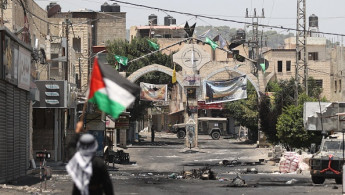Palestine and Barbados officially establish diplomatic relations amid a global wave of support over Gaza war
Palestine and Barbados signed a joint declaration officially establishing diplomatic relations in a meeting on Tuesday, two months after the Caribbean island announced it would officially recognise a Palestinian state.
Palestine’s ambassador to the United Nations, Riyad Mansour, signed the declaration at the Permanent Mission of Barbados to the UN in New York, alongside his Barbadian counterpart, Francois Jackman.
Mansour described the day as "historic" and drew parallels between the Palestinians and the Caribbean nation's struggle for sovereignty and freedom, as Barbados was a British colony from the 17th century, before achieving independence in 1966.
The two countries said their diplomatic ties would be based "on international law, with an emphasis on respecting and enhancing global peace and security, as well as the principles of equality among states", the Palestinian news agency WAFA said.
In a statement posted on X, Mansour said: "Not only do we establish our diplomatic relations and solidify our friendship between our peoples, but we also recognise our distant yet common history of a just struggle towards self-determination, towards independence, towards sovereignty, towards equality, and towards freedom."
The move comes as a number of nations took steps to officially recognise the State of Palestine in recent months, amid Israel’s ongoing onslaught in Gaza. Israel’s military campaign has killed at least 37,164 Palestinians since 7 October.
In doing so, Barbados become the 11th CAMCOM (Caribbean Community) nation to formally recognise Palestine as a state, back in April. Jamaica, the Bahamas and Trinidad and Tobago also followed suit soon after.
Minister of Foreign Affairs Kerrie Symmonds said the Barbadian cabinet had "made the determination that the time is ripe for us to have a formal diplomatic recognition of the State of Palestine".
Earlier this year, Prime Minister Mia Mottley described Israel's war in Gaza as "the world’s first televised genocide".
Spain, Norway Ireland and Slovenia also joined the growing list of nations officially recognising Palestine as a state in May and June, respectively, much to the ire of Israel.
The European leaders said the move was "essential" for a peace process between Israel and Palestine, and that Palestinians have a "fundamental, independent right to self-determination" and the "right to live in peace in their respective states".
A total of 144 out of 193 member states of the United Nations recognise Palestine as a sovereign state, as of June 2024.
Israel’s indiscriminate bombing – ongoing for over eight months – has flattened most of the Gaza Strip, rendering neighbourhoods, towns and cities almost inhabitable.
Israel's atrocities in the enclave have been described as genocide and war crimes.





 Follow the Middle East's top stories in English at The New Arab on Google News
Follow the Middle East's top stories in English at The New Arab on Google News


